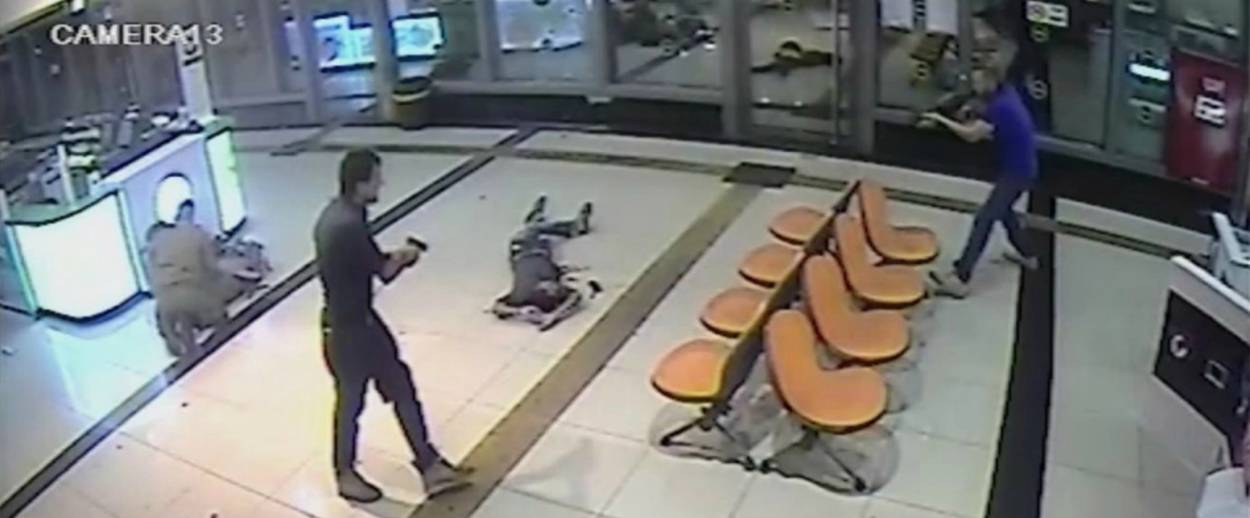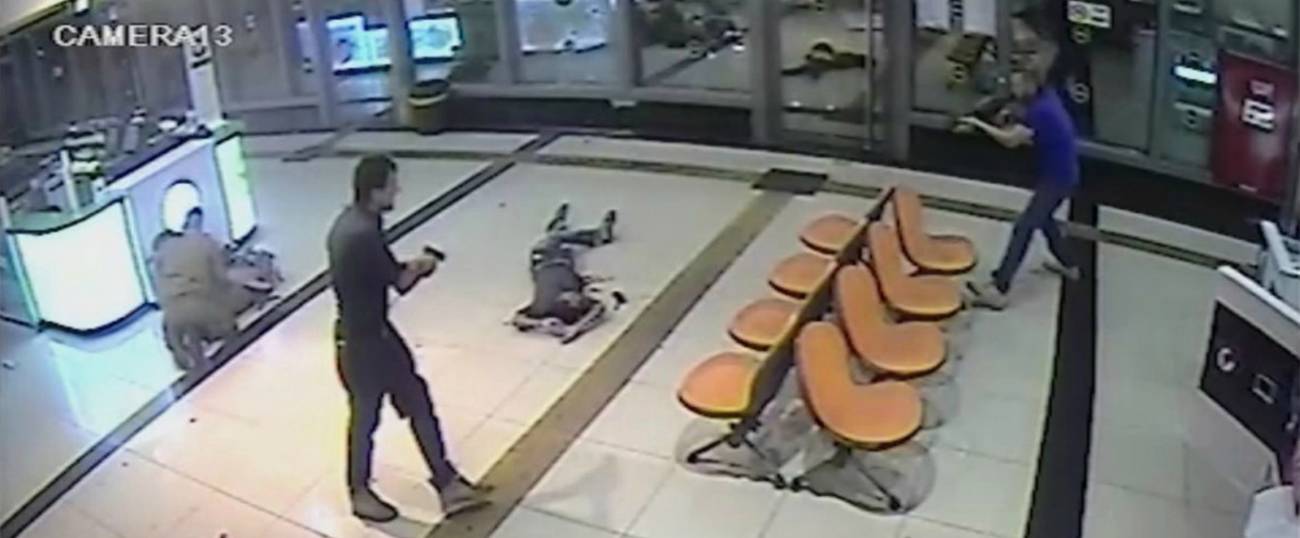‘Death in the Terminal’ Reveals the Collateral Corruption of Terrorism
A disturbing new documentary provokes necessary questions about the impact of terrorism on the terrorized, and what we should do about it




On July 22, 2005, in the wake of the 7/7 London bombings that left 54 dead, British police shot Brazilian tourist Jean Charles de Menezes eight times, killing him. They had mistaken the 27-year-old for a fugitive responsible for a bombing the previous day. On October 18, 2015, amidst daily terrorist attacks that had left dozens of Israelis shot and stabbed, Beersheba’s central bus station was attacked by a Bedouin gunman, killing one and injuring 11. After the first shots rang out, a similarly dark drama unfolded, culminating in the death of another foreigner, 29-year-old Haftom Zarhum, an Eritrean migrant mistaken for the terrorist and bloodily beaten by bystanders.
There were no smartphones to capture Menezes’s shooting in 2005, which was initially hushed up by the Crown police. But Zarhum’s killing was recorded by witnesses in the bus station, whose videos were reassembled alongside security footage into Death in the Terminal. The documentary aired on Israeli TV last year and was jointly released this week by First Look Media’s Topic and Buzzfeed News with English subtitles. What emerges on screen is a disturbing but necessary warning for all citizens of societies facing terrorism about how the fear such violence sows can corrupt its victims.
The film opens with initial images of the attack, as the day-to-day bustle of the terminal is shattered by gunfire. People flee and dive for cover. Men with guns attempt to identify the terrorist and shoot back. A clothing clerk tries and fails to save one of the victims. Another man is shot exiting the bathroom. Soon, we see a man lying prone on the floor, felled by a security guard.
The film’s devastating conceit is that directors Tali Shemesh and Asaf Sudry do not reveal that the incapacitated Zarhum is not the terrorist until late in the runtime. Instead, the audience is enveloped by the chaos and fears of the terrorized and led to assume, like many in the terminal, that the innocent man lying on the ground is in fact the perpetrator. In this way, viewers are made complicit in the choices and prejudices that led to his murder.
The filmmakers interview Ronen Cohen, a prison officer who rushed into the building after he heard the gunfire, hoping to protect those inside. Instead, he ended up pinning the innocent Zarhum to the ground with a chair, kicking him to stop him from moving, and now faces trial for his actions. We meet Moshe Kochavi, a young kibbutz volunteer who attempted to stop onlookers from hurling chairs at Zarhum, even as he initially believed him to be the terrorist. “I had to save these people,” he says. By dispensing vigilante violence, “people are corrupting, in this very moment, their soul.”
Slowly, false notes and odd asides in the interviews begin to intrude and suggest something is not right. But only two-thirds of the way through does the film reveal that the man on the ground was innocent. “He doesn’t really look like a terrorist to me,” Arab falafel vendor Hosni Kombaz recalls thinking at the time. There was no knife on the ground near Zarhum, and he was wearing slippers. “A terrorist in slippers? Even in Gaza there aren’t terrorists in slippers,” Kombaz says. “He looked Eritrean, too. Eritreans are Christians, they’re not Muslims.” But Kombaz fears to speak up, because he is an Arab.
In fact, “the real terrorist,” we are told 42 minutes in, is still shooting, and the film briefly follows the soldiers who ultimately neutralize him. Only afterwards do many of those involved realize that there was only one shooter, not two.
The film does not focus on the life of Zarhum, though his cousin is briefly interviewed, or any of the other victims of the Beersheba attack. The actual terrorist who sparked all the killing before being shot is not even named until the closing credits. This is not because Death in the Terminal is callous, but because it is really about the living, not the dead. The way the film effortlessly coopts the audience into misidentifying the murderer sends an unmistakable message: we could have been the mob.
“The best way to watch the film is not to know the story at all, because then you feel the same way the people felt there,” director Shemesh has said. “You do feel different when you think that this is the terrorist, and when you know it’s a mistake—about the same person. So it gives you a mirror on yourself.”
“This film came out amid all these immigration problems in Europe, and there were terror attacks in the U.S.,” Shemesh’s co-director Sudry told the Jewish Journal. “Everyone opened their ears and eyes to this film because of that. Everyone is afraid of ‘the other’ now.”
As the film shows, in the wake of a 9/11, 7/7, or an intifada, even the most seemingly ordinary people can be galvanized into unspeakable acts by panic and terror. In our ignorance and shock, our latent racism and fear of foreigners can be easily activated. “Ronen [Cohen],” notes Shemesh, the prison officer “that beat him in the head, he came in as a hero. He heard shooting outside and he went in. People were running out, escaping, and he went in to help. So he came in as a hero, and then he came out as totally something else. But he’s not an animal, he’s just like me. This is the point.”
“You don’t know, in this minute: What you would do? Which way will you choose?”
With its visceral and deeply personal presentation, the film is able to pose this question to viewers in a way that political polemics cannot. Within Israel, Shemesh observes, where Death in the Terminal aired on television, it provoked serious conversation and soul-searching. “People who saw the film, not just politically left-wing people … their reaction is ‘OK, OK, next time maybe I’ll stop and think.’ This is our only hope.” In this way, Death in the Terminal offers a chilling but crucial warning for Israelis, Americans, Europeans and all others seeking to fight terror on their streets without surrendering their souls.
Watch Death in the Terminal online at Topic.com here.
Yair Rosenberg is a senior writer at Tablet. Subscribe to his newsletter, listen to his music, and follow him on Twitter and Facebook.